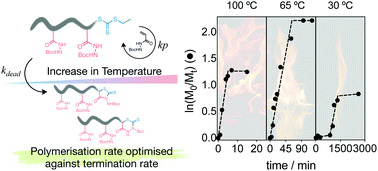Poly(Boc-acryloyl hydrazide): the importance of temperature and RAFT agent degradation on its preparation†
Abstract
Poly(acryloyl hydrazide) is a versatile polymer scaffold readily functionalised through post-polymerisation modification with aldehydes to yield polymers for biological applications. However, its polymerisation is affected by nucleophilic degradation of the RAFT agent that leads to early termination, an issue often overlooked in the polymerisation of primary acrylamides. Here we report the effect of temperature on the RAFT polymerisation of N′-(tert-butoxycarbonyl)acryloyl hydrazide (1) and demonstrate that by carefully selecting this polymerisation temperature, a balance between rate of polymerisation and rate of degradation of the RAFT agent can be achieved. This way greater control over the polymerisation process is achieved, allowing the synthesis of Boc-protected poly(acryloyl hydrazide) with higher degrees of polymerisation (DP) than those obtained previously, while still maintaining low dispersities (ĐM).



 Please wait while we load your content...
Please wait while we load your content...